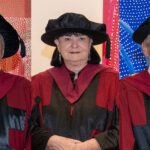Following a successful career as a lawyer, Mount Claremont resident Karen Nagappa has taken a new direction and is now helping women to birth their babies instead of giving legal advice.
At 43, Karen is one of the first students to graduate from Curtin University’s undergraduate midwifery degree and said she loves the thrill of driving around the neighbourhood knowing she has helped local mums give birth in their homes.
After graduating from UWA law school, Karen was admitted to practise law in WA in 1991, initially she worked as an Associate for a Supreme Court Judge, but then spent the next 10 years practising law with a number of major firms.
Karen successfully juggled a career as a lawyer with motherhood and, with the support of her husband, has raised three children aged between 10 and 16.
Her radical career change was inspired by a novel she read on a bus ride to work and she hasn’t looked back.
“I was always drawn to family law because of its personal nature, then I became a mother and although I enjoyed being a lawyer, it’s only now I have experienced midwifery that I feel truly passionate about what I do,” Karen said.
The three-year full-time course includes 1500 hours of clinical practice and has given Karen experience in a variety of community settings such as clinics, hospitals, birthing centres and in the mother’s home.
One of her goals was to support Aboriginal women through pregnancy in remote communities and she jumped at the opportunity to learn the art of midwifery at a community near the Western Australia and Northern Territory border.
“A highlight for me was being invited to the Ngaanyatjarra Lands in the Central Goldfields to work alongside the local midwife – it has given me a wonderful insight and I hope I can continue visiting rural communities to care for Aboriginal mothers in the future,” she said.
In the meantime, Karen has accepted a graduate position with King Edward Memorial Hospital to consolidate her past three years of study and experience. “The position will allow me to sharpen my skills and rotate through different care areas in the hospital including the labour and birth suite, the family birth centre and the adult special care unit.
Karen said the new legislation that will give midwives prescribing rights and provide them with Medicare provider numbers would open up many possibilities.
“Women now have more choice and providing they are low risk, we may see more mums choosing to give birth in the comfort of their own homes in the presence of a midwife,” she said.
Jennifer Wood, Curtin University’s Bachelor of Science (Midwifery) course coordinator said the course combined evidence-based theory and clinical practice.
“Students start their clinical experience in the first semester and receive clinical experience in a wide range of community and hospital settings,” Jennifer said.
“The midwife’s work may be clinical, research or policy-based and can involve other aspects of women’s health, sexual or reproductive health, lactation consultancy and childcare – those who have a highly developed knowledge base and many clinical skills, are in demand both nationally and internationally.”
The course is accredited by the Nursing and Midwifery Board of Australia (NMBA).
Contacts:
Denise Cahill, Public Relations, Curtin University
Tel: 08 9266 1931, Mobile: 0401 103 683, Email: d.cahill@curtin.edu.au
Web: http://curtin.edu.au


